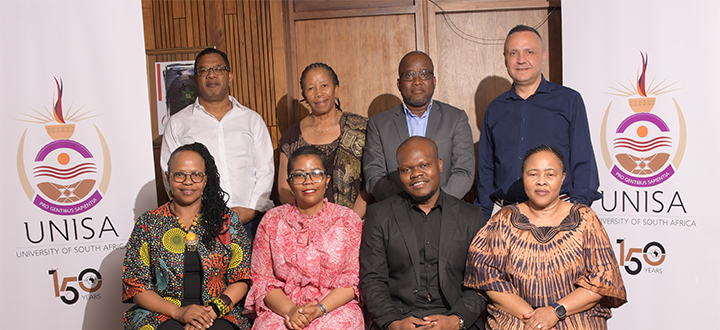University of South Africa strengthens relations with NRF
he executive leadership of the University of South Africa (Unisa) and the National Research Foundation (NRF) met recently at the Unisa Muckleneuk Campus to cement relations between the two institutions.
The Unisa delegation, led by the Principal and Vice-Chancellor, Prof Puleng LenkaBula, included Prof Zodwa Motsa-Madikane, Vice-Principal: Teaching, Learning, Community Engagement and Student Support; Prof Thenjiwe Meyiwa, Vice-Principal: Research, Postgraduate Studies, Innovation and Commercialisation; and Prof Madipoane Masenya, Executive Director: Office of the Principal and Vice-Chancellor. The NRF delegation, led by the Chief Executive Officer, Dr Fulufhelo Nelwamondo, included its two deputy CEOs, Dr Clifford Nxumalo (responsible for National Research Infrastructure Platforms) and Dr Eugene Lottering (responsible for Research and Innovation Support Platforms), as well as the Executive Director responsible for Strategy, Planning and Partnerships, Dr Aldo Stroebel.
Among the key objectives of the visit by the NRF to Unisa are the following :
A meet-and-greet/introduction of the relevant executives from both institutions.
A deliberation on how the two institutions may collaborate strategically to improve the performance of the science and innovation system.
Getting Unisa’s perspective on innovation and the impact of publicly-funded research.
Exploring ways in which the NRF can assist in instilling the right culture in universities.
Exploring ways in which the NRF can improve its support to universities in general, especially a Comprehensive ODeL university such as Unisa.
In articulating the perspective from the NRF, the CEO, Dr Nelwamondo, emphasised the need for research to have a meaningful impact on society. He raised the importance of transformation, but cautioned that issues of transformation should not mean a compromise of excellence but that we should instead advance transformation through excellence, with zero tolerance for low quality research and a compromise on excellence. The NRF CEO highlighted the importance of the question of impact and innovation, especially the critical importance of social innovation. He emphasised that excellence locally ought to translate into excellence globally, with sustainability as a critical component.
As far as Unisa is concerned, the NRF was keen to establish what Unisa’s grand plans are and how they would impact on the national scene. This includes internationalisation and the global impact of the plans. Furthermore, he added that researchers should be encouraged to participate in the peer review processes as this could go a long way towards mitigating the perceived challenge of gate-keeping.
In response, Unisa Principal and Vice-Chancellor, Prof LenkaBula began by appreciating and pointing out the significance of the visit by the NRF, which she said created a perfect opportunity for the two institutions to learn from each other and for making constructive interventions.
“There is a need to strengthen the scientific agenda and prioritise the areas that are critical for the requisite innovations. The infrastructure that the NRF makes available is not fully exploited and the question is how do we encourage our researchers in this regard? Also, how do we construct and enhance partnerships with other universities,” said Prof LenkaBula.
She also alluded to the need for the NRF to address deficiencies in the university system in order to address a variety of concerns that have been raised, a case in point being the establishment of the School of Veterinary Sciences at Unisa. She requested a sense of advocacy from the NRF on such matters.
“As Unisa celebrates the important milestone of 150 years at the forefront of higher education, our optimisation of research and innovation could assist greatly in the strengthening the country’s scientific agenda,” concluded Prof LenkaBula.
After the meeting between the senior executives of Unisa and the NRF, the two delegations proceeded to a meeting with the Executive Deans and Deputy Executive Deans of all the colleges at Unisa, where fruitful discussions around strategic collaborations continued.

